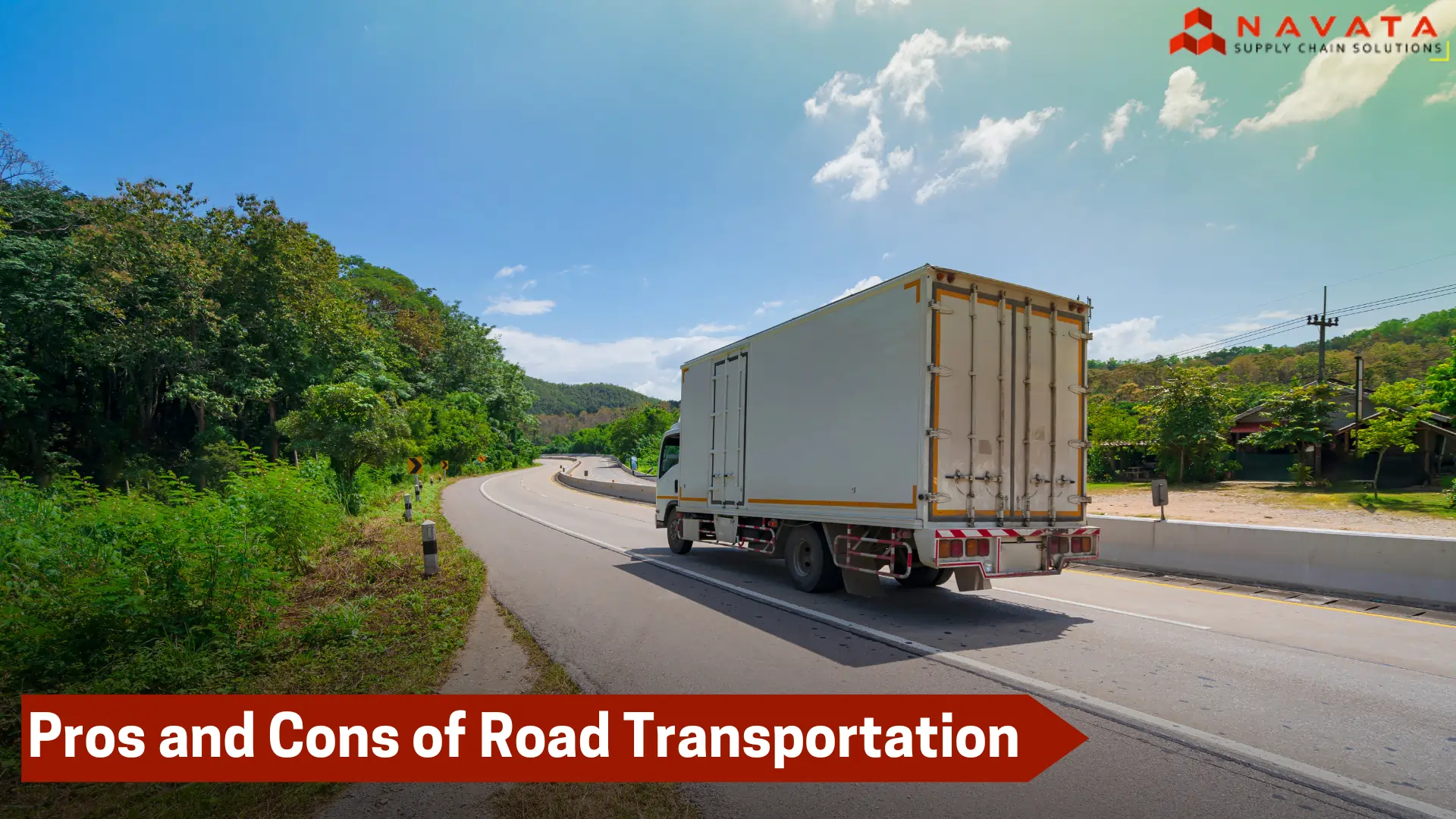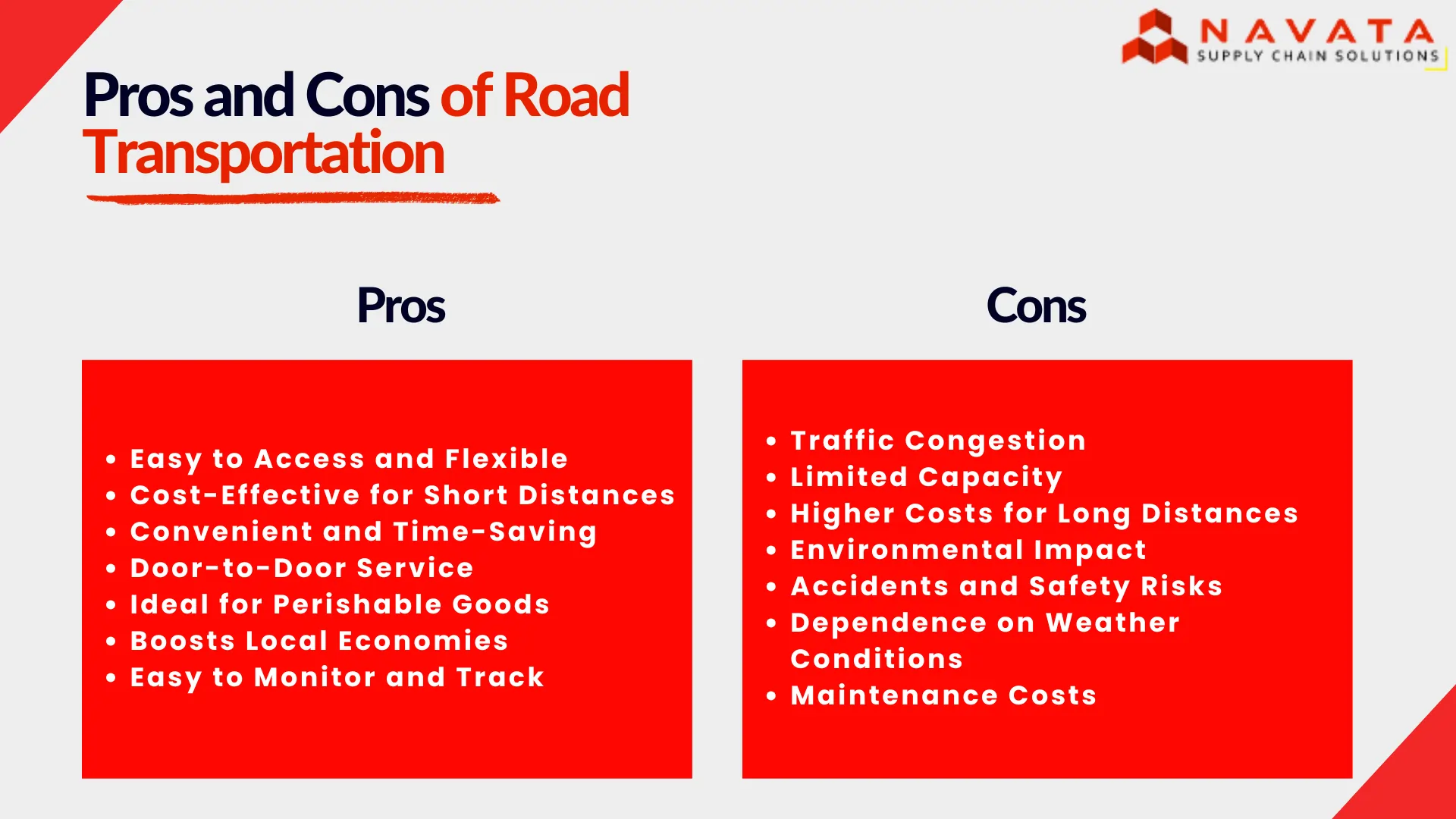Pros and Cons of Road Transportation
Road transportation is one of the most common ways to move people and goods from one place to another. Whether it’s a delivery truck bringing your online order, a bus taking you to work, or your family car heading out on a road trip, road transport plays a huge role in our daily lives. But like everything else, it has its advantages and disadvantages. In this blog, we’ll explore the pros and cons of road transportation.

You May Also Like to Read: Road Transportation vs Rail Transportation
Pros of Road Transportation
1. Easy to Access and Flexible
One of the biggest advantages of road transportation is its accessibility. Roads reach almost every corner of a country, including rural and remote areas where other modes of transport like trains or planes can’t go. You can travel or send goods directly from your doorstep to your destination without needing to switch between different modes of transport.
2. Cost-Effective for Short Distances
For short distances, road transport is often cheaper than air, rail, or sea transport. You don’t need to pay for expensive tickets or deal with complex logistics. Even for businesses, using trucks or vans to deliver goods locally is more affordable than other options.
3. Convenient and Time-Saving
Road transport is incredibly convenient. You can travel or transport goods whenever you want, without relying on fixed schedules like trains or flights. This flexibility saves time, especially for last-minute trips or urgent deliveries.
4. Door-to-Door Service
Unlike other modes of transport, road transportation offers door-to-door service. For example, a delivery truck can pick up goods from a warehouse and drop them off directly at a customer’s home. This eliminates the need for additional handling or transfers.
5. Ideal for Perishable Goods
Road transport is perfect for transporting perishable items like fruits, vegetables, dairy products, and medicines. Refrigerated trucks can maintain the right temperature, ensuring that these goods stay fresh during transit.
6. Boosts Local Economies
Roads connect small towns and villages to bigger cities, making it easier for farmers, artisans, and small businesses to sell their products in larger markets. This helps local economies grow and creates job opportunities.
7. Easy to Monitor and Track
With modern technology like GPS, it’s easy to track vehicles and shipments in real time. This ensures better security and allows businesses to keep their customers informed about delivery statuses.
You May Also Like to Read: Effective Route Optimization Strategies
Cons of Road Transportation
1. Traffic Congestion
One of the biggest challenges of road transport is traffic jams, especially in cities. Heavy traffic can lead to delays, increased fuel consumption, and frustration for drivers and passengers.
2. Limited Capacity
Compared to trains or ships, road vehicles like trucks and vans have limited carrying capacity. This makes road transport less efficient for moving large quantities of goods over long distances.
3. Higher Costs for Long Distances
While road transport is cost-effective for short distances, it can become expensive for long-distance travel or shipping. Fuel costs, tolls, and vehicle maintenance add up, making it less economical than rail or sea transport for long hauls.
4. Environmental Impact
Road transportation is a major contributor to air pollution and greenhouse gas emissions. Vehicles running on diesel or petrol release harmful gases like carbon dioxide, which contribute to climate change. Noise pollution from vehicles is another concern, especially in urban areas.
5. Accidents and Safety Risks
Road accidents are a significant downside of road transport. Poor road conditions, reckless driving, and vehicle malfunctions can lead to accidents, causing injuries or even fatalities. This makes safety a major concern for both passengers and drivers.
6. Dependence on Weather Conditions
Bad weather like heavy rain, snow, or fog can disrupt road transport. Flooded roads, landslides, or icy conditions can make driving dangerous or even impossible, leading to delays and cancellations.
7. Maintenance Costs
Roads and vehicles require regular maintenance. Potholes, cracks, and other road damages need to be repaired, and vehicles need frequent servicing. These maintenance costs can be high for both governments and individuals.

How Can We Balance?
While road transportation has its challenges, it remains an essential part of our lives. To make it more sustainable and efficient, we can adopt solutions like:
- Using electric or hybrid vehicles to reduce emissions.
- Improving road infrastructure to minimize traffic and accidents.
- Encouraging carpooling or public transport to reduce the number of vehicles on the road.
- Investing in better technology for real-time traffic management and route optimization.
Conclusion
Road transportation is a double-edged sword. On one hand, it’s flexible, convenient, and accessible, making it a lifeline for millions of people and businesses. On the other hand, it faces issues like traffic congestion, environmental impact, and safety risks. By understanding its pros and cons, we can make smarter choices about how we use road transport and work towards making it more sustainable for the future.
Whether you’re a business owner shipping products or a commuter heading to work, road transportation is likely a part of your daily life. By being aware of its strengths and weaknesses, we can all contribute to a smoother, safer, and greener journey.
Thank You For Reading: Pros and Cons of Road Transportation
Powered By 360Presence

